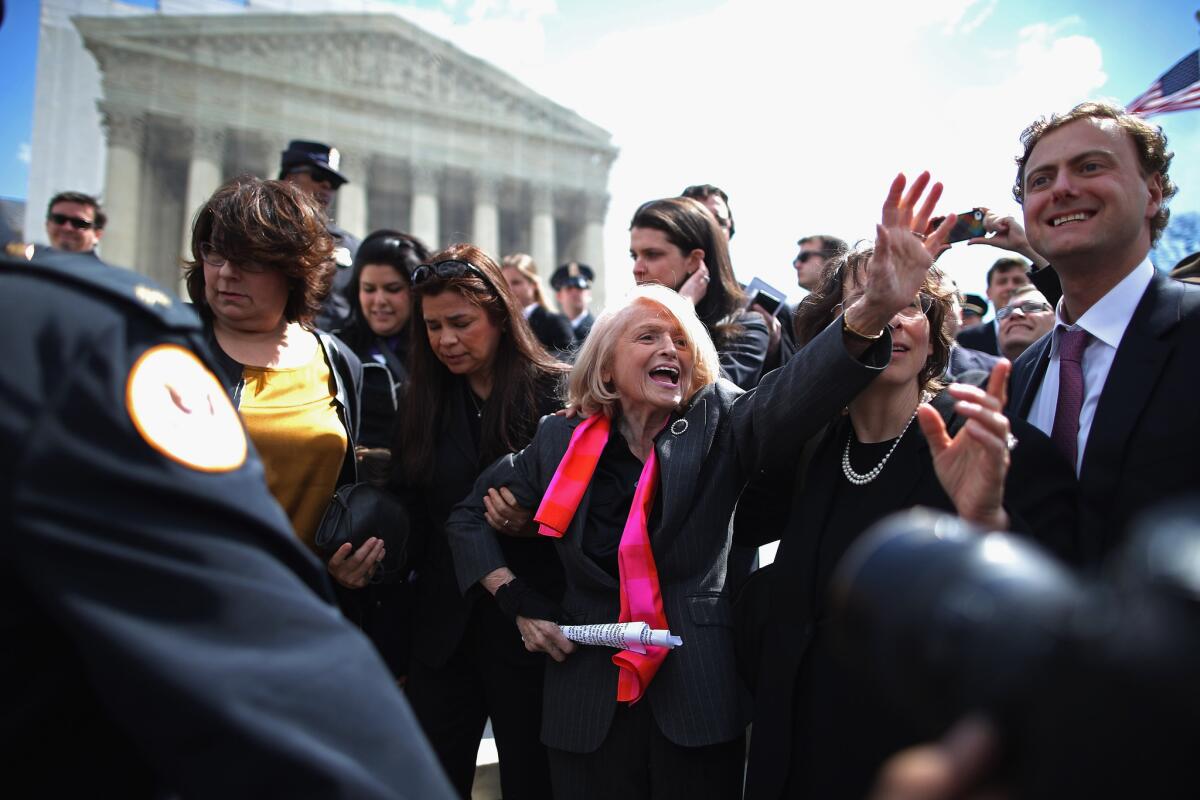Analysis: Supreme Court’s DOMA ruling still shaping gay marriage 1 year later

The nation on Thursday marks the first anniversary of the Supreme Court’s decision to strike down a portion of the Defense of Marriage Act, a ruling that has shifted the political spectrum on gay issues and changed how society organizes itself.
In 1996, Congress passed and President Clinton signed DOMA, which defined marriage as between “one man and one woman as husband and wife.” Section 3 of the legislation said that same-sex marriage was not recognized for any federal purpose, including insurance benefits, taxes, immigration rules and Social Security survivor’s benefits.
By striking down Section 3, the Supreme Court in effect gave gay spouses legal standing, but stopped short of legalizing same-sex marriage. This set off a flurry of lawsuits across the nation as partners fought against states’ same-sex marriage bans or pushed to have their marriages recognized in states where same-sex marriage is illegal. Other legal battles have involved family issues such as adoption.
GRAPHIC: Gay marriage in the U.S.
On Wednesday, gay marriage advocates received a major victory when a split U.S. 10th Circuit Court of Appeals in Denver upheld a lower court ruling that struck down Utah’s ban on same-sex marriage. The move is likely to be appealed, eventually to the Supreme Court, state officials said.
The Utah ruling is just one of several such cases moving through the courts. Oklahoma has a same-sex marriage case pending before the same appellate circuit. A Virginia case has been argued before the 4th Circuit in Richmond and a decision is pending. Other appeals are to be argued this summer and are likely to work their way up to the Supreme Court, which will decide which cases, if any, it wants to consider.
Nineteen states and the District of Columbia have legalized same-sex marriage, but lawsuits are pending in every other state.
Though the Supreme Court does not have to take up any case, many experts are hoping it will deal with the issue, which essentially pits an individual’s constitutionally protected rights to marry whomever he or she wants against the state’s prerogative to regulate the institution of marriage and the rearing of children.
The high court’s DOMA ruling, also known as the Windsor case, for its lead plaintiff, is one of the key decisions on which the gay marriage movement has built what appears to be a legal juggernaut, winning cases in more than a dozen jurisdictions. The other often-cited ruling is the 1967 Supreme Court decision outlawing the ban on interracial marriage.
DOCUMENTS: Supreme Court decisions on DOMA, Prop. 8
In recent weeks, President Obama, who once opposed gay marriage but later changed his position on it, has announced regulatory changes to extend a wide range of marriage benefits to same-sex couples. The actions are important, officials have said, because without them, same-sex couples could be blocked from receiving federal benefits in states that do not recognize their marriages.
Some departments, like Labor, clarified leave policies to treat same-sex spouses the same as heterosexual ones. Other agencies formally expanded benefits to same-sex couples where allowed by law. The Obama administration said it would also seek congressional action where needed.
Obama’s movement toward supporting gay marriage mirrors growing acceptance of the practice throughout the United States. A Gallup poll last month showed that 55% of Americans support same-sex marriage. In 1996, when Gallup first asked about the issue, 27% of Americans surveyed said they believed that gay marriage should be legal.
President Clinton, who said he had no choice but to sign DOMA because it passed Congress by enough votes to make it veto-proof, spent years saying the law should be overturned.
In a video message, Clinton said he was “honored and grateful to be among the voices urging” the overturning of DOMA. The former president’s remarks will be included in a program honoring gay rights activists that will be shown Thursday on Logo TV, a cable channel aimed at gay and lesbian viewers. The special, called “Trailblazers,” will mark the first anniversary of the high court ruling and will pay tribute to two figures in the case: Roberta A. Kaplan, a lawyer, and Edith Windsor, the DOMA plaintiff.
“As marriage equality spreads across the states, the number of people impacted by these two amazing women will only continue to grow,” Clinton said, according to a transcript of his comments.
Meanwhile, his wife, Hillary Rodham Clinton, on tour to promote her new memoir, “Hard Choices,” has pushed back against the idea that she opposed same-sex marriage as first lady for political reasons. The tour is widely seen as a possible precursor to a White House run, and any Democrat will have to court the same-sex constituency for votes and contributions.
Hillary Rodham Clinton told Terry Gross of NPR that “for me, marriage has always been a matter left to the states.” Gross pressed Clinton, who added: “I think you are trying to say that I used to be opposed and now I am in favor and I did it for political reasons. And that’s just flat wrong.”
Follow @latimesmuskal for national news.
More to Read
Sign up for Essential California
The most important California stories and recommendations in your inbox every morning.
You may occasionally receive promotional content from the Los Angeles Times.











